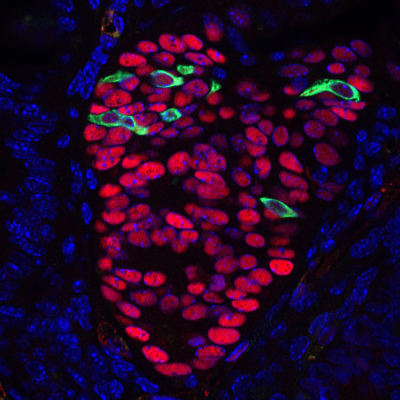Team Philippe JAY
Self-renewal and differentiation of epithelia

Our team studies the interface function of the gastric and intestinal epithelia, between the microbiome and some pathogenic agents. Our main goal is to understand how we adapt to environmental changes. According to such variations, we monitor specific modifications of the digestive mucosa, including epithelial cells, the immune system and immunomodulatory epithelial cells called tuft cells. Our data shed light on the mechanisms involved in conditions such as chronic inflammatory diseases, infectious diseases and cancer, with the ultimate aim of identifying novel therapeutic opportunities.
Our team, and others, recently discovered the first function of intestinal epithelial tuft cells as sentinels capable of identifying luminal dangers and initiate appropriate immune responses in the lamina propria (Gerbe et al., Nature 2016), and more recently described their crosstalk with Paneth cells to regulate the microbiome (Coutry et al., PNAS 2023).
Ongoing projects aim at unravelling novel facets of the tuft cell function, for instance with the production of effector molecules such as acetylcholine to fight parasite infections. We also investigate the mechanisms in tuft cells that can lead to the establishment of a deleterious immune context and facilitate the emergence of chronic inflammatory diseases and cancer in the stomach and intestine.

Dclk1-expressing epithelial tuft cells are present in mouse intestinal tumors, as evidenced by the ectopic expression of the Sox17 marker (red). Nuclei are stained with DAPI (Blue).

 IGF Nord 107b
IGF Nord 107b 04 34 35 92 98
04 34 35 92 98
 IGF Nord 121
IGF Nord 121 04 34 35 93 03
04 34 35 93 03
 IGF Nord 121
IGF Nord 121 04 34 35 93 03
04 34 35 93 03
 IGF Nord 103
IGF Nord 103 04 34 35 92 66
04 34 35 92 66
 IGF Nord 103
IGF Nord 103 04 34 35 92 66
04 34 35 92 66
 IGF Nord 103
IGF Nord 103 04 34 35 92 66
04 34 35 92 66
 IGF Nord 107b
IGF Nord 107b 04 34 35 92 98
04 34 35 92 98
 IGF Nord 103
IGF Nord 103 04 34 35 92 66
04 34 35 92 66
 IGF Nord 121
IGF Nord 121 04 34 35 93 03
04 34 35 93 03- Coutry N., Nguyen J., Soualhi S., Gerbe F., Meslier V., Dardalhon V., Almeida M., Quinquis B., Thirion F., Herbert F., Gasmi I., Lamrani A., Giordano A., Cesses P., Garnier L., Thirard S., Greuet D., Cazevieille C., Bernex F., Bressuire C., Winton D., Matsumoto I., Blottière H.M., Taylor N. and Jay P. Crosstalk between Paneth and tuft cells drives dysbiosis and inflammation in the gut mucosa. Proc Natl Acad Sci U S A 2023 Jun 20;120(25): e2219431120. doi: 10.1073/pnas.2219431120. PMID:
- Bas J., Jay P*. and Gerbe F.* Intestinal tuft cells, what else? Semin Cell Dev Biol. 2023 Dec : 150-151:35-42. doi: 10.1016/j.semcdb.2023.02.012. PMID. *: corresponding authors
- Bruschi M., Garnier L., Gerbe F., Cleroux E., Dumas M., Bardet A.F., Quesada S., Cesses P., Weber M. and Jay P. Loss of Apc rapidly impairs DNA methylation programs and cell fate decisions in Lgr5+ intestinal stem cells. Cancer Res. 2020 Jun 1;80(11):2101-2113. doi: 10.1158/0008-5472.CAN-19-2104. PMID: 32213541.
- Bornstein C., Nevo S., Giladi A., Kadouri N., Pouzolles M., Gerbe F., David E., Machado A., Chuprin A., Toth B., Goldberg O., Itzkovitz S., Taylor N., Jay P., Zimmermann V., Abramson J. and Amit I. Single cell mapping of the thymic stroma identifies IL25-producing tuft epithelial cells. Nature 2018 Jul;559(7715):622-626. doi: 10.1038/s41586-018-0346-1. PMID: 30022162.
- Gerbe F. and Jay P. Intestinal tuft cells: epithelial sentinels linking luminal cues to the immune system. Mucosal Immunol. 2016 Nov;9(6):1353-1359. doi: 10.1038/mi.2016.68. PMID: 27554294.
- Gerbe F., Sidot E., Smyth D. J., Ohmoto M., Matsumoto I., Dardalhon V., Cesses P., Garnier L., Pouzolles M., Brulin B., Bruschi M., Harcus Y., Zimmermann V. S., Taylor N., Maizels M. and Jay P. Intestinal epithelial tuft cells initiate type 2 mucosal responses to helminth parasites. Nature 2016 Jan 14;529(7585):226-30. doi: 10.1038/nature16527. PMID: 26762460.
- Gerbe F., van Es J. H., Makrini L., Brulin B., Mellitzer G., Robine S., Romagnolo B., Shroyer N. F., Bourgaux J.-F., Pignodel C., Clevers H. and Jay P. : Distinct ATOH1 and Neurog3 requirements define tuft cells as a new secretory cell type in the intestinal epithelium. J Cell Biol. 2011 Mar 7;192(5):767-80. doi: 10.1083/jcb.201010127. PMID: 21383077. Editorial comment on this article on page 706 of the same issue.
- Escobar M., Nicolas P., Sangar F., Laurent-Chabalier S., Clair P., Joubert D., Jay P. and Legraverend C. : Intestinal epithelial stem cells do not protect a copy of their genome by asymmetric chromosome segregation. Nat Commun. 2011 Mar 29:2:258. doi: 10.1038/ncomms1260. PMID: 21448157.
- Gerbe F., Brulin B., Makrini L., Legraverend C. and Jay P. : DCAMKL-1 expression identifies tuft cells rather than stem cells in the adult mouse intestinal epithelium. Gastroenterology 2009 Dec;137(6):2179-80; author reply 2180-1. doi: 10.1053/j.gastro.2009.06.072. PMID 19879217.



